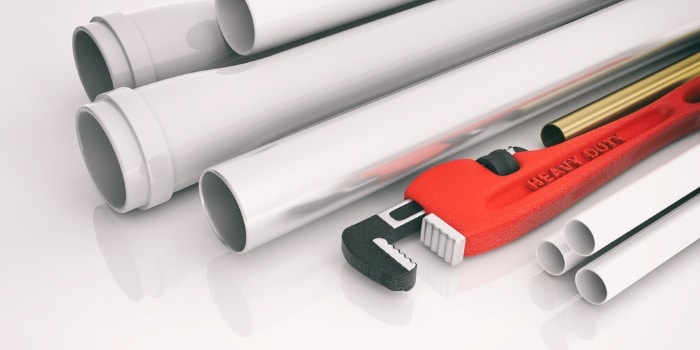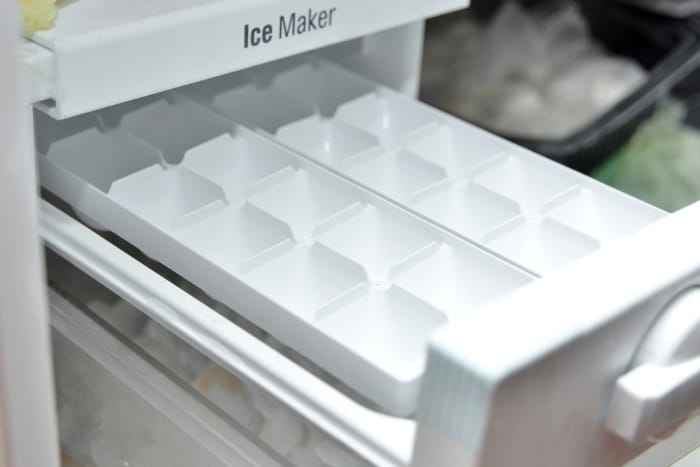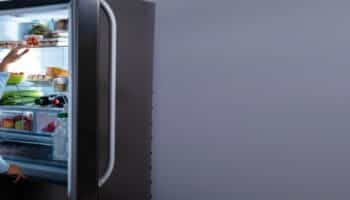We've independently reviewed this article to make sure it's as accurate as we can make it.
To find out more about our article creation and review process, check out our editorial guidelines.
Is your fridge leaking more water than a sewer on a rainy day?
Better find your swimsuit before it’s too late! On a more serious note, though, I know how annoying it can be to have your fridge leak water all over the place and make a mess that’ll take a while to clean up.
But don’t worry; you’ve come to the right place for answers. Below, you’ll find a list including 7 common causes behind a fridge that’s leaking water and some simple solutions you can try.
When your fridge is leaking water, you’ll want to check your external water sources, the water inlet valve, the John Guest fitting, the PVC lines, and the water filter. You’ll also want to take a look at the ice maker, the drain lines, and the evaporation pan.
Keep reading to stop the leak!
Why trust us? This article was written by Craig Anderson and Andy Fulenchek.
Craig has helped thousands of other homeowners repair their appliances since 2016.
Andy is one of our resident appliance repair experts with over a decade of experience. He currently runs his appliance repair company with a team of trusted technicians.
Why Your Fridge Is Leaking Water
Leaky fridges are never good news; however, some of the issues that are causing your fridge to spill water all over the kitchen floor are not as complex or concerning as others. In many cases, the leaking can come from a failure with the water valve, the water filter housing, and the ice maker.
Here are some things I recommend you try.
#1 Check Your External Water Sources
The first thing I find useful to check when a fridge is leaking water are external water sources.
Sometimes, the leaking doesn’t have anything to do with there being something wrong with your fridge but rather with a broken jug of water or any other container with a liquid inside.
In my opinion, it’s important to start by considering such a simple issue before going inside your refrigerator and moving things around, as it might not be necessary.
Solution: Check your fridge shelves and the water jugs resting on them. Ensure no leaks are coming from external sources.
If there are, try removing the broken jug/container, wait a couple of hours, and see if the leak is still present. If so, please read on.
#2 Check the Water Inlet Valve
Checking your water inlet valve can also help when your fridge is leaking water.
The water inlet valve is the component responsible for drawing water from your home’s supply and sending it to the ice maker and water dispenser.
If the water inlet valve sustains any damage or has loose connections, it can explain why your fridge is leaking everywhere.
Solution: My usual recommendation when you suspect the water inlet valve is damaged or improperly connected to other components is to observe it thoroughly.
The location of your inlet valve will vary depending on your fridge’s make and model; please refer to your User Manual for a specific location and the instructions to access it. If you don’t have the manual handy, check out our free resource below.
Once you know the location of your water inlet valve, try the following steps:
- Examine the valve at the point where it enters the refrigerator. Check for leaks at the gasket inside the screw that attaches to the wall inlet.
- Ensure connections from the wall valve to the refrigerator are not leaking.
- Tighten connections by hand, followed by an additional eighth of a turn using a wrench.
My recommendation is to prefer stainless lines over copper lines, as copper can freeze and burst.
#3 Check the John Guest Fitting
A damaged water valve/John Guest fitting can also explain why your fridge is leaking water all over your kitchen floor.
Water valves and John Guest fittings work together to supply your fridge with water and ensure there are no leaks during the process. However, sometimes either one or both can freeze and crack, causing leaking and a wide range of other issues.
Solution: I find that observation of both the valve and the fitting can go a long way in determining whether they’re damaged and need replacement.
If you spot anything out of the ordinary, please follow the steps below:
- Inspect the water valve at the refrigerator for cracks, especially if there are signs of freezing.
- Look for damage in the John Guest fitting.
- Activate the water dispenser and ice maker valves to inspect leaks when energized.
As with the water inlet valve, you’ll find all the right instructions and replacement parts for your fridge in your User Manual.
#4 Check Your PVC Lines & Water Filter
Provided both the water valve and John Guest fitting are okay, the next thing I recommend you check when your fridge is leaking water are the PVC lines that connect to the water filter.
The PVC lines help move the water from your home’s inlet to the parts of your fridge that need it. And while most of the time, the pipes do a great job, I find that sometimes pinholes, larger breaks, and loose connections can cause them to leak all over the floor.

Solution: Closely examine the PVC lines connecting the valve to the water filter housing and look for signs of damage or freezing.
If you spot any, you’ll have to replace the PVC lines to stop the leaking and prevent it from happening in the future.
#5 Check Your Ice Maker
Your ice maker is great at helping you get fresh drinks, but if it fails, it can explain why your fridge leaks all over the kitchen.
There’s a waterline that goes into the ice maker, which constantly transports water to make ice cubes. Under normal circumstances, the process happens without any hiccups, but issues can arise if there’s damage to the water line or it’s not properly secured to the ice maker inlet.

Solution: To address issues with your ice maker and its water line, please follow the steps below:
- Ensure the waterline to the icemaker is aligned.
- Check for cracks in the icemaker, which might cause water to drip.
- Investigate if the water inlet tube for the icemaker is overfilling or misaligned.
In my experience, fixing issues with the ice maker’s water line is not too complicated or expensive unless you have to replace the entire ice maker. In such cases, you’re likely looking at a couple hundred dollars worth of repairs.
#6 Unclog/Defrost Drain Lines
Your fridge cannot only draw water from the wall inlet, but it can also dispose of excess water when the limit has been reached.
When working normally, the drain line in your fridge is constantly pumping water out to prevent leaking, but when it fails, it can explain your current situation.
Solution: If you’ve already tried all the solutions above, chances are the drain line is already exposed and has enough visibility for you to inspect it and work on it comfortably.
You’ll have to look for water buildup turning into ice in the freezer or standing water beneath the crisper trays in the refrigerator. Drain line issues are common in single evaporator refrigerators – especially in brands like Samsung, LG, Whirlpool, and GE.
#7 Check the Evaporation Pan
Lastly, let’s take a look at your evaporation pan as the last possible reason why your fridge is leaking all over the floor.
The evaporation pan’s main job is to collect any excess water that’s been removed from the fridge during the ongoing cooling process. It’s common to see leaks when the pan has cracks or holes or when it has filled over its limit.
Solution: Look carefully at the pan and try to spot any kind of damage on it. If you want to remove the pan from the fridge, please be careful; you don’t want to break it.
If you determine the pan is broken or has pinhole leaks, you’ll have to contact your manufacturer for a replacement. Provided you’re still under warranty coverage, you should be able to get the new pan free of charge unless otherwise specified in your documents.
I strongly advise you to periodically check all connectors and components in your fridge to prevent leaks and spot problems before they become expensive to repair.
Addressing Your Fridge’s Leaking
That about covers it!
When your fridge is leaking water all over your kitchen floor, it’s normal to feel frustrated and wonder how much you’ll have to pay to get things back to normal.
Luckily, as I hope this piece has helped you better understand, addressing the most common causes behind a fridge leaking water can be easy and quick. More often than not, simple actions, like checking the connection between the water valve and the John Guest fitting, will do the trick.
Thanks for sticking with me all the way to the end. If this article was useful and answered all your questions, please check out our other resources and free guides below and consider subscribing to our newsletter.
Have a wonderful week!
-Craig.








